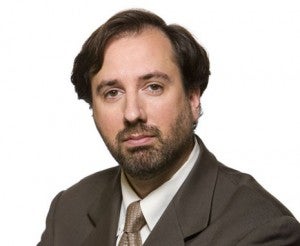Robert Alt is director of the Rule of Law Programs and senior legal fellow at The Heritage Foundation’s Center for Legal and Judicial Studies. He sat down with us to discuss Heritage’s Overcriminalization project.
Q: How long have you been working on the Overcriminalization project?
A: Five years. Overcriminalization was a part of the portfolio that I took on when I started with Heritage. It is funny to think that just five years ago, not many people had even heard of overcriminalization. Now, after two congressional hearings focused on the topic (and a third where the issue predominated), a series of front-page articles in The Wall Street Journal, and multiple case studies that became the basis of Heritage’s book One Nation Under Arrest, many more average citizens and Members of Congress are aware of the problem.
Q: What surprised you most when you became involved in the fight against overcriminalization?
A: The severity of the injustice in particular cases. For example, the case study of Krister Evertson, who was arrested for not having the correct label on a shipment of sodium. It is difficult to believe that a prosecutor would go after him twice or that he would be dragged from his car at gunpoint.
Q: With organizations across the ideological spectrum supporting and agreeing on overcriminalization issues, what are the obstacles to reform?
A: Rent-seeking is a big obstacle. For example, reform of the Lacey Act, which makes violation of foreign laws a federal crime, was prevented in part by local industries, which saw this as a way of using the sledgehammer of criminal law to keep their competitive advantage.
[Second,] I think that Congress is more attuned to the issue of overcriminalization, but Congress at times responds to high-profile problems by creating new criminal laws that are duplicative or increase penalties. Once they are on the books, it is difficult to unring the bell.
Third, [there is] pressure from prosecutors and the law enforcement community. While prosecutors want to do the right thing, they don’t want to lose any of the options they have to prosecute.
Q: What are the biggest victories you have seen?
A: Getting the word out. Heritage, along with Professor John Baker, refreshed the [American Bar Association] Task Force study on the number of federal crimes. The Heritage–Baker study is regularly cited for the number of federal criminal laws throughout the media.
Another major success is Without Intent, the study regarding mens rea that Heritage put together with [the National Association of Criminal Defense Lawyers], which was cited in over 100 news stories after it was published.
There have been two major congressional hearings on overcriminalization and another that turned into a hearing on overcriminalization. Congress has made attempts to deal with overcriminalization with the FOCUS Act and the Relief Act. There was a hearing discussing the need to consider overcriminalization in every piece of legislation.
Numerous pieces of legislation have been rejected or changed because of congressional champions who are aware of the problem of overcriminalization.
Q: What aspect of overcriminalization do you see as the biggest threat to individual liberty?
A: I think it is criminal regulations. With over 300,000 criminal regulations, most of which are strict liability offenses, it is simply impossible for average or even legally savvy Americans to know everything that is a potential regulatory crime. This is a trap for the unwary and wary alike.
Q: Do you expect to see overcriminalization becoming a major political issue?
A: I think that it already has. We are in election season right now, and the economy for obvious reasons is dominating the debate, but we have seen overcriminalization capture the political imagination. For example, you have the Gibson Guitar case. After Gibson was raided, the CEO of Gibson Guitar was invited by Representative [Marsha] Blackburn [R–TN] to sit with her at the State of the Union address. This case helped to bring home the problem of overcriminalization.

































2 Replies to “INTERVIEW: Heritage’s Robert Alt on Overcriminalization”